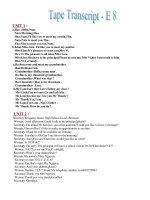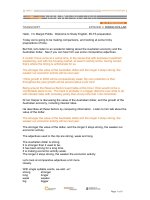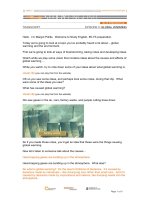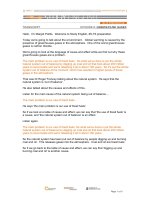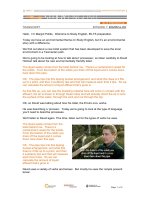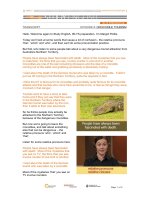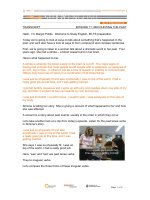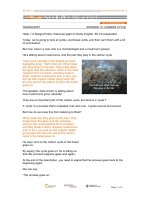- Trang chủ >>
- Đề thi >>
- THPT Quốc Gia
s2019 transcript
Bạn đang xem bản rút gọn của tài liệu. Xem và tải ngay bản đầy đủ của tài liệu tại đây (272.8 KB, 5 trang )
TRANSCRIPT
EPISODE 19: OLD TREES
Hello. I’m Margot Politis. Welcome to Study English, IELTS preparation.
Today we’re going to look at a story about trees in Melbourne. Trees have certain
functions. They provide shade and shelter, they give scale to the tall buildings and
they demonstrate the changing seasons.
English is no different! It has a range of functions, or purposes. When you reach a
certain stage in your language development, you’ll need to focus more on the
meaning and functions of English at the sentence level, and also how to connect
sentences. With practice, your fluency and competence in both spoken and written
English will develop.
John Hawker, who is a horticulturalist with Heritage Victoria, is concerned that the old
trees planted in Melbourne in the 1850s are nearing the end of their lives. Listen to
John discussing the problem of managing trees in urban areas.
Trees are very much a part of our urban fabric.
People enjoy them for their size, variety and
colour and form, so we'd just be left with
nothing, which would be disastrous.
There's a need to assess the health and the
condition of these trees and embark upon a
removal and a replacement program.
We'll be helping the City of Melbourne doing that assessment and we'll be identifying
where, what trees should be replanted.
John is discussing the problems of old trees in Melbourne.
He begins with a statement of fact:
“People enjoy trees for their size, variety, colour and form.”
He follows this statement with an opinion:
“To allow these old trees to die and not replace them would be disastrous.”
Can you see the purpose or function of these two sentences? John is building a
persuasive argument about trees. He begins with a fact, and then adds an opinion.
Now he goes on to list some of the problems faced by these trees. The function of
this sentence will be to support his argument with reasons.
Page 1 of 5
Listen to the causes of the problem.
Well, there are quite a few problems with some
of the trees.
Firstly, the trees, some are very old and
nearing the end of their life. That's been
hastened to some extent by recent very dry
conditions in Melbourne and other
environmental factors.
John begins by identifying the reasons for the problem.
The ‘trees are old’ and nearing the end of their life. This natural ageing process has
been made worse by ‘recent dry conditions’ in Melbourne, and ‘other environmental
factors’.
His argument is more convincing because he explains the reasons for the problem.
This is one of the important functions of English you’ll need to learn – to order your
thoughts in a logical pattern, and support them with reasons and examples.
So to make a good, persuasive argument, John has given the facts of the problem
and given us opinions, reasons and examples. Then John explains a solution to the
problem.
There's a need to assess the health and the
condition of these trees and embark upon a
removal and a replacement program.
We'll be helping the City of Melbourne doing
that assessment and we'll be identifying where,
what trees should be replanted.
John’s solution is to ‘assess the trees’, and
then ‘remove older trees’ and ‘replace them with younger trees’.
The argument is further developed by another tree expert, Ian Shears, who works for
the City of Melbourne.
With replacement of elms, such as in St Kilda Road, for example, we want to be
putting in trees which are of a significant size. So if you do it on a short term basis,
you just can’t go out to a nursery and get something of any stature at all.
Ian makes a suggestion – to ‘plant large size elm trees’.
He adds the fact that large trees are ‘not available from nurseries’ in the short term.
His un-stated conclusion is so strong we understand it implicitly: we ‘must plan long
term’ for this to succeed.
Page 2 of 5
So you can see how both trees and English have certain functions. Like the different
parts of a tree all help to make it complete, English sentences have different
functions that combine to make effective communication.
Sentences serve several purposes or functions. These can be:
‘stating a fact’,
‘giving an opinion’,
‘making a suggestion’,
‘giving an example’,
‘stating a reason’,
or ‘giving a cause.
See if you can identify different functions.
“The world’s population is increasing.”
Is that an ‘opinion’, a ‘fact’, or a ‘solution’?
It’s a ‘fact’.
“Fines for drink driving are unacceptable.”
Is that an ‘opinion’, a ‘suggestion’, or a ‘cause’?
It’s an ‘opinion’.
“Poverty is rising due to unemployment rising.”
Is that an ‘example’, a ‘suggestion’, or a
‘cause’?
It’s a ‘cause’.
In an essay, ‘opinions and arguments’ are supported by:
‘reasons and explanations’,
‘causes and examples’,
‘facts and statements’,
‘proposals and predictions’,
‘results and solutions’.
Page 3 of 5
Let’s construct a short paragraph. Note how it is constructed, beginning with a topic
sentence, followed by a series of supporting and developing sentences with different
functions.
“Music has many benefits.”
fact
“It provides a common language, …“
benefit
“… which breaks down barriers. “
explanation
“The Beatles are popular around the world”.
example
“Music helps people relax.”
benefit
“Dance music is used for exercise, …”
fact
“… because it promotes movement.”
reason
“Some people prefer reggae.”
fact
“They seem very relaxed.”
opinion
Listen to John Hawker again construct his argument.
Trees are very much a part of our urban fabric. People enjoy them for their size,
variety and colour and form, so we'd just be left with nothing, which would be
disastrous.
There's a need to assess the health and the condition of these trees and embark
upon a removal and a replacement program.
We'll be helping the City of Melbourne doing that assessment and we'll be identifying
where, what trees should be replanted.
Well, there are quite a few problems with some of the trees. Firstly, the trees, some
are very old and nearing the end of their life. That's been hastened to some extent
by recent very dry conditions in Melbourne and other environmental factors.
Page 4 of 5
To stay with our tree analogy, you can see how
the argument is steadily built up with different
functions: the opening topic sentence is like the
seedling. Once the idea is planted, it grows
through benefits and facts, is strengthened with
reason, coloured with opinion, and develops
interesting offshoots with suggestions and
proposals. Explanations and examples fill out
the foliage, and the end result is a beautiful and
original creation!
So now that we understand the functions of sentences, let’s construct an argument
paragraph.
“Trees are lovely.”
opinion
“They make oxygen,”
fact
“which is necessary for life.”
benefit
“We should all plant one.”
suggestion
“It could change cities…”
prediction
“…by providing more shade.”
benefit
“Melbourne is planting trees…”
example
“…to replace its old ones.“
reason
And that’s all for Study English today. We’ve looked at a variety of different functions
in a text. You can find out more about the different functions of sentences by going
to our Study English website.
I’ll see you next time on Study English. Bye bye.
Page 5 of 5
